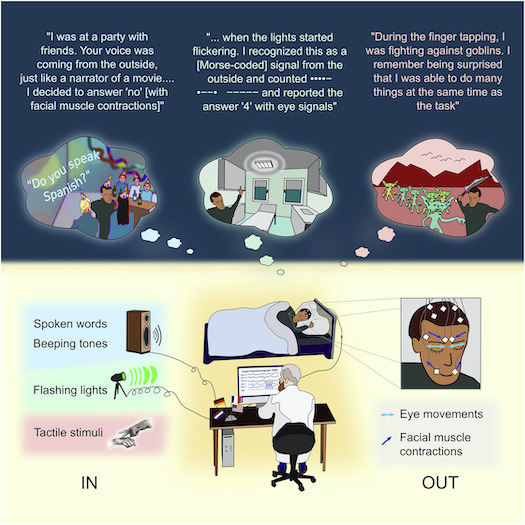Scientists Communicate in Real Time With People Who Are Asleep

Hello Subtle Realm readers,
This article could not be overlooked here at Subtle Realm. This is a big development in the area of dreams and sleep science. For years, scientists have been able to influence dreams using external means, but results have been spotty due to the inability of the subjects to recall their dreams (either accurately or at all) upon waking. And no experiments have involved the subjects communicating back to the experimenters while dreaming - in real time - until now.
Here we have an article describing recent scientific experiments in which scientists have been able to successfully communicate in real time with people who are asleep. Here is what the experiment entailed in brief:
A group of 36 people were selected. Participants were divided into three groups: (1) experienced lucid dreamers, (2) healthy people with no experience who were trained to lucid dream, and (3) a narcoleptic patient who reported frequent lucid dreaming. The scientists constructed a system of communication using taps, flashing lights, and/or sounds as external stimuli. The sleepers used a pre-arranged set of signals using unique eye movements and facial muscle contractions to report answers to the questions asked after the stimuli were administered.
The experimenters waited until the sleepers were in REM sleep because lucid dreaming is strongly associated with the REM state. The sleepers were able to signal with eye movements or facial contractions when they were having a lucid dream, and that's when the experimenters began to interact with them.
When the external cue was given (a flash of light for example), the sleeper was told in a soft voice to obtain complete lucidity in the moment and direct their attention to the voice, and then the voice immediately asked a question of the sleeper. The sleeping subject was to answer using the eye movements or muscle contractions which produce measurable electrical signals and were thus recorded by sensors attached to the subject. The questions asked were not given to the sleeper prior to going to sleep, and so neither the questions nor the answers became repetitive.
Here is a brief summary of the results. The dreamer reached REM sleep and conveyed he was dreaming lucidly using the pre-arranged signals. The experimenters verbally asked the question: "8 minus 6". Answer: "2". The question was repeated, the same answer given. In real time. Upon awakening (immediately after the question/answer exchange was recorded) the dreamer recounted his lucid dream fairly accurately to the experimenters. He recalled much of the verbal instructions verbatim, though there were some distortions in his post-dream interpretation.
For information on what controls were used and other questions about how the experiment was conducted, please read the article in its entirety.
Is the passing of this small bit of information (the answer to the math problem: 'two') during an experiment between a sleeping subject and a wakeful scientist a big deal? While the amount of information may be small, it is monumental in the arena of sleep science, and in science in general!
There has been a convention of thought around the condition of the human being during sleep - that we are closed off to anything but strong stimuli and are incapable of rational thought while our bodies remain inert for recharging. In light of how we are perceived when we wake up from sleep (grogginess), our difficulty remembering our dreams clearly, and our lack of knowledge regarding lucid dreaming, this is entirely expected. But in at least one mode of consciousness (lucidly dreaming REM sleep) this has been scientifically disproven as a result of these experiments. Humans have long known that consciousness remains active during sleep, but now that we have the results of this experiment, our understanding should be far more broad. Our attitudes toward sleep should change, especially since (on average) we spend about 37 percent of our lives asleep.
The experiment showed that people still think and use their logical minds when their bodies are asleep. They were able to take in information not previously known to them, think about/process it, and give an answer to a problem that involved the information - all while asleep. This establishes that, at least while lucid dreaming, our consciousness is still active much like it is while awake.
The fact that the subjects sometimes could not remember, or would remember a distorted version of the events that transpired during the experiment shows a limitation of consciousness that can be avoided if the communication with the sleeper is in real-time. This has long been a hindrance to studying sleep and sleep experiences scientifically.
The implications of this research are vast! The creative nature of consciousness while dreaming is well known.
There have been many instances of artists who have admitted that a piece of art came to them in a dream. Inventors have come forward with similar stories. Could the next technological game-changer come from a lucid dreamer? Could artists be nudged into giving the world musical and visual masterpieces? Could we help lessen the pain caused by abuse? Could a scientist be gently guided to a discovery that would solve the energy crisis? Could we at last learn about the nature of consciousness itself?
Copyright © 2026, SubtleRealm
